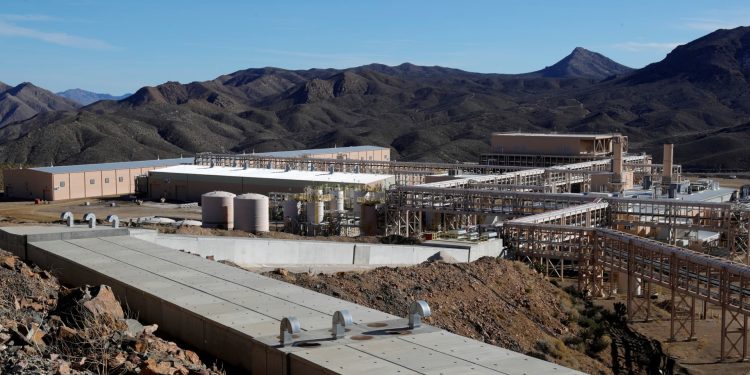A view of mining facilities at the MP Materials rare earth mine in Mountain Pass, California, United States, January 30, 2020.
Steve Marcus | Reuters
China has tightened export controls on rare earths and related technologies while banning its citizens from participating in unauthorized mining activities abroad, adding new tensions to a sector critical to its geopolitical influence.
Foreign entities must now obtain a license from Beijing to export any product containing more than 0.1% domestically sourced rare earths, or made using Chinese mining, refining, magnet-making or recycling technology, the Commerce Ministry said Thursday.
To prevent “misuse” of rare earth minerals in the military and other sensitive sectors, companies linked to foreign militaries or placed on export control or monitoring lists will be denied permits, the Commerce Department said. Requests for items that may be used for military, terrorist or other military purposes will also be rejected.
The latest move marks a “major improvement in rare earth export controls,” extending restrictions from just raw materials to intellectual property and technology, said Dan Wang, China director of Eurasia Group. China added several rare earths and related materials to its export control list in April.
These restrictions could further increase other countries’ dependence on Chinese know-how while supporting Beijing’s efforts to move its own industries up the value chain, Wang added.
Chinese citizens are also prohibited from supporting overseas activities related to rare earth mining and magnet manufacturing without Beijing’s approval.
The new rules on the export of rare earths will come into force on December 1, while those on technologies and labor came into force immediately, according to official statements.
Applications to export rare earths used in the production of sub-14 nanometer semiconductors, advanced memory chips, semiconductor manufacturing or testing equipment, or artificial intelligence with potential military applications will be considered on a case-by-case basis, the ministry said.
These measures primarily target the defense sector, said George Chen, partner at The Asia Group, as part of Beijing’s efforts to eclipse U.S. defense capabilities.
Rare earths are essential to high-tech industries including automotive, defense and semiconductors. Tightening access to rare earths has disrupted international supply chains caught in the crossfire this year between the United States and China.
“Beijing has realized that it has influence in this sector and clearly has no qualms about using it,” said Wendy Cutler, senior vice president of the Asia Society Policy Institute and a former U.S. trade negotiator. This decision could push Washington to make new concessions in the ongoing negotiations, such as tariff reductions or a relaxation of American controls on exports.
Negotiation levers
China accounts for about 70% of the world’s supply and has repeatedly used the much-needed minerals as a bargaining chip in trade negotiations.
The latest restrictions came just weeks before a possible meeting between US President Donald Trump and his Chinese counterpart Xi Jinping. The two leaders are expected to meet in person on the sidelines of the Asia-Pacific Economic Cooperation forum during the last week of October in Gyeongju, South Korea.
Although China has remained silent on upcoming meetings, Trump also said he would visit China early next year and that Xi would come to the United States at a later date.
The new announcement can be seen as “a round of negotiations” that Beijing wants to conclude even before the next round of major trade talks, said Chen of The Asia Group.
“The Chinese side is gaining more and more experience in dealing with its counterparts and knows what its American friends want,” Chen added.
Since late last year, China has tightened restrictions on exports of rare earths, including requiring proof that they will not be used for military purposes. Beijing began issuing single-use export licenses following a trade truce with Washington in May.
Although China’s official data showed that exports of rare earth magnets have recovered in recent months, progress appears uneven. The European Chamber of Commerce said in a survey published last month that Beijing’s tight grip had cost at least one of its members “millions of euros”, while other members cited inconsistent procedures for obtaining export approvals.
A Chinese ministry spokesperson said Thursday the new rules would provide some exemptions, including for exports intended for emergency medical situations or disaster relief. A “transition period” will also allow companies to fulfill existing contracts and meet compliance requirements.
The transition window is likely to mitigate some short-term impacts for companies, Eurasia’s Wang said, noting that “in the same way that the U.S. ban on technology exports to China left room for U.S. tech companies to lobby and seek approval — most of them actually got approvals.”
“This will give China more power than just a brutal ban,” Wang said.
— CNBC’s Evelyn Cheng contributed to this story.









